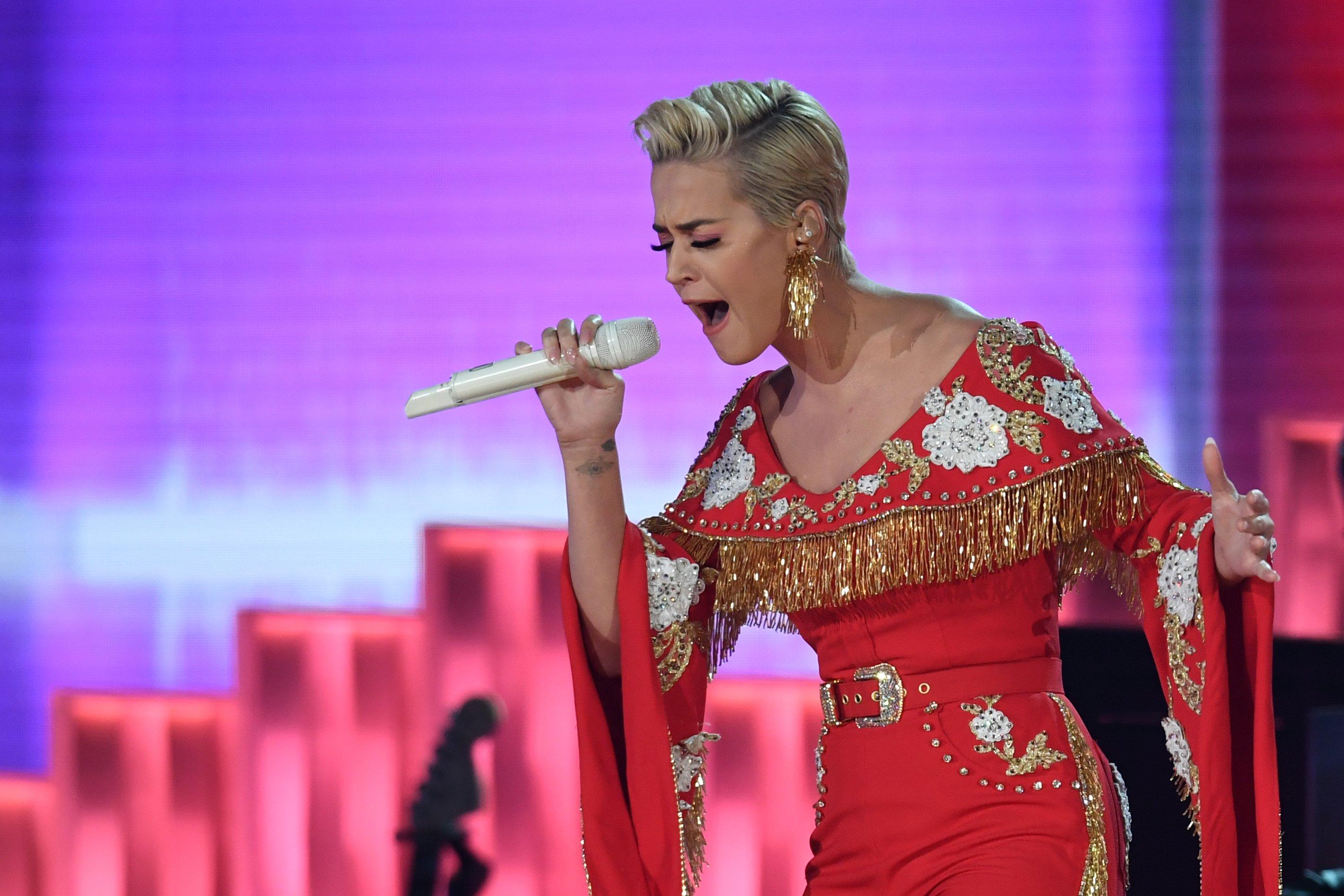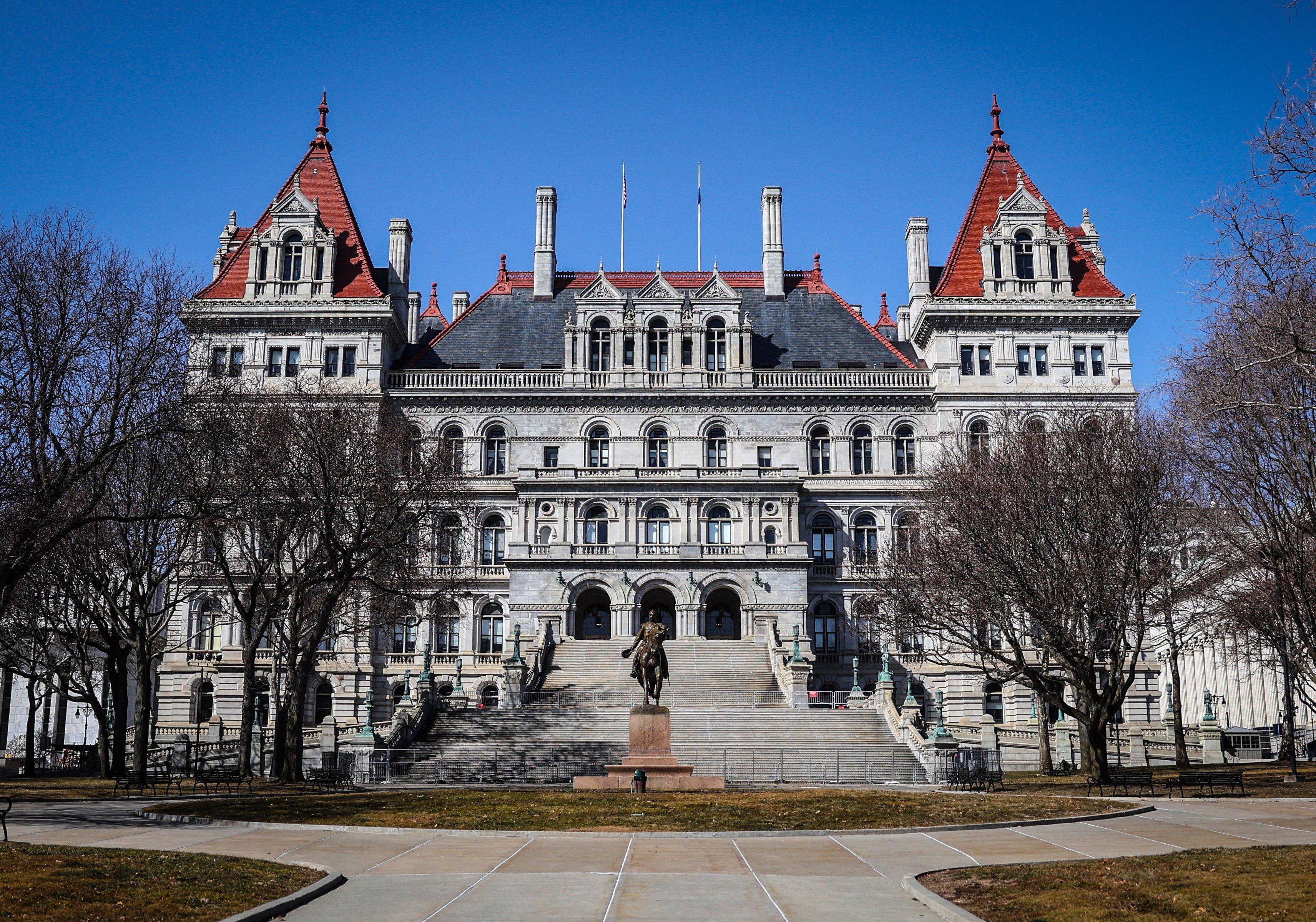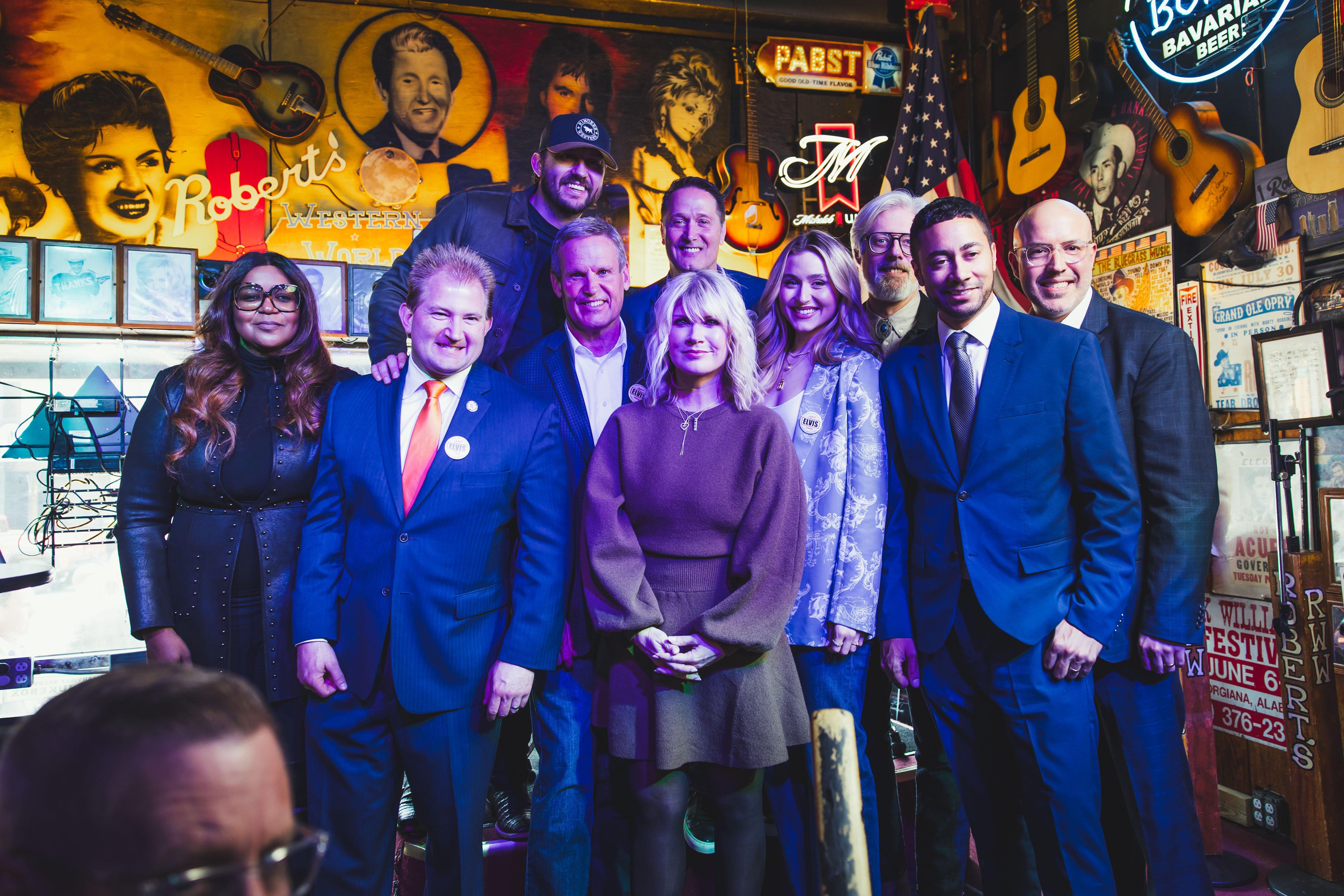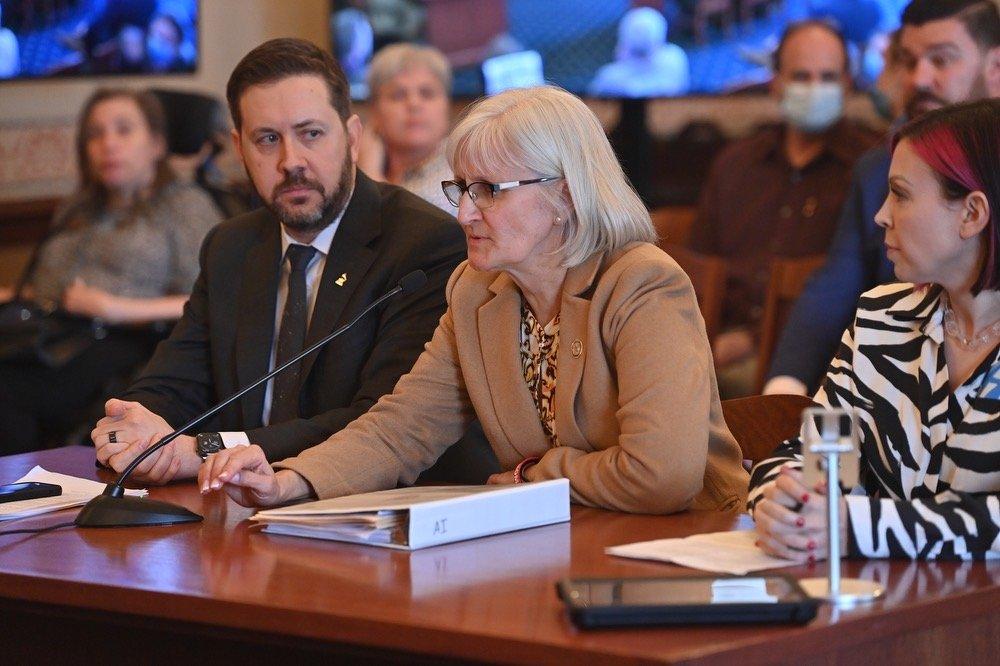Photo: ROBYN BECK/AFP/Getty Images

Katy Perry
news
How The CASE Act Empowers Creators & Prevents Copyright Trolling
The large-scale "Dark Horse" copyright case reminds us of the necessity of the CASE Act's small claims process and its invaluable protections for all
The blockbuster Flame v. Katy Perry copyright lawsuit over "Dark Horse" has made big-time news recently in the music industry, but lost in the splash of the headlines over GRAMMY nominated artists is the fact that litigating copyright violations is simply infeasible for the average artist, songwriter or creator.
A case in the magnitude of “Dark Horse” would incur hundreds of thousands of dollars in legal fees just to be heard in court, which is only justifiable based on a potentially large settlement. The federal court system is unattainable to a songwriter who is lucky to earn even a few thousand dollars for their song, leaving most in the music industry with rights but no remedies. For music creators and other creative industries this is a problem, and the CASE Act is its solution.
<blockquote class="twitter-tweet"><p lang="en" dir="ltr">The bill that creates small claims process for copyright holders wins one more battle in the fight for creators' rights – here's how you can help it keep going. <a href="https://twitter.com/hashtag/CASEact?src=hash&ref_src=twsrc%5Etfw">#CASEact</a> <a href="https://t.co/dH0xweUIMF">https://t.co/dH0xweUIMF</a></p>— GRAMMY Advocacy (@GRAMMYAdvocacy) <a href="https://twitter.com/GRAMMYAdvocacy/status/1152629496064937984?ref_src=twsrc%5Etfw">July 20, 2019</a></blockquote> <script async src="https://platform.twitter.com/widgets.js" charset="utf-8"></script>
The Copyright Alternative Small Claims Enforcement (CASE) Act, would create a copyright small claims court that would help independent music creators protect their work. By capping damages at $30,000 and allowing claimants to initiate action without a lawyer and without needing to appear in court, the bill will go a long way to help independent music creators fight infringement without going broke in the process.
Because many working music creators can't afford the type of legal fees associated with a major copyright lawsuit such as the “Dark Horse” case, many are left unable to defend their work. The CASE Act addresses this challenge faced by average music creators unable to enforce infringement because the modest recovery potential often cannot justify the high expenses of litigation.
Some argue the “Dark Horse” verdict could throw open the flood gates for what is known as "copyright trolling," where the troll attempts to coerce a legitimate copyright holder or user into court by bringing frivolous claims against them. Such fears are unfounded when it comes to the CASE Act, which contains numerous safeguards against trolling, even more than exist under current federal law.
For starters, the CASE Act makes the small claims process inhospitable to trolling, providing respondents with the opportunity to opt out of any case and imposing severe penalties for bad faith or frivolous claims. The Copyright Claim Board has the authority to award attorney fees up to $5,000 to the respondent, ban the claimant from filing for a year and even dismiss all pending cases filed by the claimant. The message of the CASE Act is clear: It doesn’t pay to troll.
<blockquote class="twitter-tweet"><p lang="en" dir="ltr">Some groups have falsely alleged that the <a href="https://twitter.com/hashtag/CASEAct?src=hash&ref_src=twsrc%5Etfw">#CASEAct</a> would enable so-called "copyright trolls" to abuse the system and get away with it. The truth? This legislation will do more to prevent trolling than any measures previously taken. <a href="https://twitter.com/hashtag/MySkillsPayBills?src=hash&ref_src=twsrc%5Etfw">#MySkillsPayBills</a> <a href="https://t.co/jOXNknf4i2">https://t.co/jOXNknf4i2</a></p>— Copyright Alliance (@Unite4Copyright) <a href="https://twitter.com/Unite4Copyright/status/1159162671989702657?ref_src=twsrc%5Etfw">August 7, 2019</a></blockquote> <script async src="https://platform.twitter.com/widgets.js" charset="utf-8"></script>
With solid protection against nefarious claims and bold empowerment for the working class music creator, the CASE Act implements safe, affordable and accessible court system, not for the Dark Horse-level copyright lawsuits, but for the average creator who deserves the same due process.
Supported by both Democrats and Republicans, the CASE Act was passed without objection by the Senate Judiciary Committee last month and now waits for consideration by the House Judiciary before being voted on by all Members of Congress. You can show your support for the bill by contacting your Members of Congress and urging them to push the CASE Act through for the benefit of music creators and the music industry.
Let Your Members Of Congress Know You Stand In Support Of Music Creators' Rights

Photo: Aaron Foster via Getty Images
news
Ticketing Reforms Make A Big Leap In Maryland: Here's What You Need To Know
This legislation introduces a series of pivotal measures aimed at safeguarding consumers and enhancing transparency in the ticketing industry.
The Recording Academy celebrated last week the advancement of improved ticketing reforms as Maryland achieves a groundbreaking milestone with the passage of SB 539. This legislative triumph not only means a new era of consumer and artist protections for live event tickets, but also positions Maryland as a national leader in holding ticket resellers accountable for fraudulent and deceptive practices hosted on their platforms.
"While fans suffer because of this broken system, so do artists" declares a collective statement of support from the Fix the Tix Coalition, which includes the Recording Academy as a founding member. "Predatory resellers view tickets as nothing more than commodities to be traded for outrageous sums, throwing away the cultural and communal value they provide for our society. They exist to undermine the hard work, talent, and livelihoods of artists, inserting themselves as unnecessary and unwanted middlemen who make their money off the backs of the artists and venues who partner to make these events happen."
This legislation introduces a series of pivotal measures aimed at safeguarding consumers and enhancing transparency in the ticketing industry. First, the bill prohibits deceptive practices such as the selling of speculative or counterfeit ticket sales, shielding concertgoers from exploitative practices used by some ticket brokers and resellers. Second, online ticket resale platforms will face increased accountability under Maryland's Consumer Protection Act.
Additionally, transparent pricing practices will be enforced throughout the ticket purchasing process, ensuring consumers have clear and accurate information. Most notably, this includes standards that ensure a breakdown of the face value price, and any fees, is made clear to the consumer throughout the purchase.
"We're getting used to paying these exorbitant prices. It's funny, now if you get a ticket for face value, that's apparently a big deal," stated Delegate C.T. Wilson, who introduced the legislation in Maryland's House. "That shouldn't be a big deal. We've been tricked into accepting this."
The enforcement of SB 539 seeks to dismantle predatory practices that have long plagued the ticketing industry. From the moment a show is announced, genuine fans are confronted with the uphill battle against scalpers and resellers, who exploit loopholes and employ deceptive tactics to profit at the expense of both fans and artists.
"Legislation like SB 539 is vital to protecting fans, preserving equitable access to entertainment, and restoring balance to the currently broken ticketing ecosystem," the collective statement emphasizes. By removing the profit motive from these practices, such as using illegal bots and price gouging, Maryland's bold legislative actions sets a precedent for other states to follow suit in protecting consumer rights and ensuring a better concert experience for fans and artists alike.
The Recording Academy was one of the many stakeholders who actively worked to pass the legislation and will continue to work towards equitable ticketing practices across the country. There is a collective aspiration that the passage of this legislation in Maryland will serve as a catalyst for change at both the local and federal level.
The Academy remains a staunch advocate for ticketing reform, ensuring that every fan can enjoy the magic of live entertainment without fear of deception or exploitation.
The New York State Senate Passes Bill to Protect Creative Expression: Here's What You Need To Know

Photo: Thomas A. Ferrara/Newsday RM via Getty Images
news
The New York State Senate Passes Bill to Protect Creative Expression: Here’s What You Need To Know
Led by Senators Hoylman-Sigal and Bailey, the senate passage of S. 1738 continues the forward momentum for creative expression in New York, signaling the state senate’s commitment to upholding free speech.
In a significant stride towards protecting musicians' creative expression, the New York State Senate passed S. 1738 on March 27. This bill is aimed at safeguarding the free speech of artists, a fundamental part of making music. The Recording Academy has been a staunch advocate of S. 1738, working to advance the legislation in the last two legislative sessions of 2022 and 2023.
Led by Senators Hoylman-Sigal and Bailey, the senate passage of S. 1738 continues the forward momentum for free expression in New York, signaling the state senate’s commitment to upholding the fundamental rights of creators to express themselves through their art. The legislation stipulates that a defendant's artistic works, such as song lyrics, cannot be used as evidence against them in a criminal trial unless it can be proven beyond reasonable doubt that these expressions are admissible.
Researchers have identified nearly 700 cases where lyrics have been used as evidence against hip hop artists, including several dozen in New York. Protecting the First Amendment rights of New York artists is critical to prevent a chilling effect on the state’s music community that plays a vital role in the economic landscape of New York. The music industry in New York contributes close to $20 billion to the state's GDP annually, supporting over 200,000 jobs. From iconic recording studios in New York City to vibrant music scenes in upstate cities like Albany and Buffalo, the state's diverse music community contributes to its reputation as a global hub for creativity and innovation. New York attracts millions of visitors each year to experience live performances, music festivals, and other events throughout the state.
The Recording Academy's support for this legislation in New York is part of a broader effort to champion similar legislation across the country at the state level. In California and Louisiana, the Recording Academy played a pivotal role in passing new laws that solidified the protection of creators' free speech rights. Additionally, in Maryland, Missouri, and Georgia, the Academy has been advancing similar legislation. A recent Advocacy Day in Annapolis, supporting the PACE Act, allowed Recording Academy members from Maryland to meet with legislators and urge them to protect creative and artistic expression.
At the federal level, the Recording Academy has been advocating for the Restoring Artistic Protection Act, also known as the RAP Act since its introduction. Just like at the local level, this legislation aims to protect the First Amendment rights of artists nationwide. Recording Academy CEO, Harvey Mason jr., and Chair of the Recording Academy's Black Music Collective, Rico Love, released a statement during the introduction of the RAP Act in 2022:
"Today's introduction of the RAP Act in the House of Representatives is a crucial step forward in the ongoing battle to stop the weaponization of creative expression as a prosecution tactic," they stated, “ and we will continue to work…to advance the protections in this bill that ensure all artists can create freely without fear of their work being criminalized."
Now, with the successful passage of S. 1738 in the New York State Senate the Recording Academy will continue to work with Academy members to help advocate for this necessary legislation, including bringing Academy members to Albany next month to advocate for the bill’s passage through the state assembly. Ultimately, the goal is to see S. 1738 signed into law, providing much-needed protections for musicians and affirming New York's commitment to upholding the principles of free speech and artistic expression.
As the legislative journey continues, Recording Academy advocates will continue to advance this critical piece of legislation and ensure that the voices of musicians are valued and protected in the state of New York.
A Victory In Tennessee: Governor Bill Lee Signs The ELVIS Act Into Law

Photo: Brandon Hull
news
A Victory In Tennessee: Governor Bill Lee Signs The ELVIS Act Into Law
The signing ceremony hailed as the "coolest bill signing ever" by Gov. Lee, took place at Robert's Western World, an iconic Honky Tonk in downtown Nashville.
On Thursday, March 21, the Recording Academy celebrated an extraordinary moment for Tennessee's vibrant music community as Governor Bill Lee signed the groundbreaking ELVIS Act into law. The signing ceremony hailed as the "coolest bill signing ever" by Gov. Lee, took place at Robert's Western World, an iconic Honky Tonk in downtown Nashville, showcasing the deep connection between music and culture in the state.
Surrounded by Country music stars Luke Bryan and Chris Janson, Gov. Lee emphasized the significance of protecting musicians, acknowledging their role in shaping Tennessee's identity and history. "This industry has helped forge and created the identity of this state" stated Gov. Lee, "and what you've done is not only created and forged our identity and our history here, but much of what is happening in this country."
When discussing the implications of what this legislation means for creators across the state, Gov. Lee highlighted the dangers of AI now being prevented. "[AI] can steal those gifts, it can impersonate those gifts, it can subsequently create fake works that rob those artists of their intellectual property that has made their success, and we can't let that happen. Tennessee should lead on this issue, and we are, this is the first bill of its kind."
Also attending the signing ceremony were Gebre Waddell, the Academy's national Secretary/Treasurer and Chair of the Tennessee Entertainment Commission, artists Natalie Grant and Matt Maher, who testified in support of the ELVIS Act before the Tennessee legislature, and additional artists and elected leaders representing the Academy's Memphis and Nashville Chapters.
In January, the Recording Academy joined Gov. Lee, House Majority Leader William Lamberth and Senate Majority Leader Jack Johnson, and dozens of artists, songwriters, music executives, and industry groups to introduce the Ensuring Likeness, Voice, and Image Security (ELVIS) Act. The Recording Academy's support for the ELVIS Act, including advocacy days and mobilization of music creators, played a pivotal role in the bill's success. By uniting Tennessee's artists and legislators, the Recording Academy spearheaded a collective effort to combat AI fraud and safeguard the authenticity of music creation.
Tennessee has a booming music community that supports more than 61,000 jobs across the state and contributes $5.8 billion to the state's GDP. During the signing ceremony, Chris Janson highlighted his gratitude for this legislation supporting the growing music community in Tennessee. "This is a serious thing. I am a songwriter first; I've always said that; I'm an artist second. I love what I do, I'm grateful for my job, and I am so grateful for leadership who cares." Janson directly thanked the members of Tennessee's General Assembly for supporting this legislation. "We are grateful for you guys protecting our community," declared Janson, "Nashville is nothing without the music community."
The signing of the ELVIS Act marked a historic milestone as the first legislation in the nation focused on safeguarding the core elements of artistic identity, including voice and likeness, in the context of AI. This groundbreaking law updates Tennessee's existing right to publicity, extending protections to songwriters, performers, and all individuals' voices from exploitation by artificial intelligence.
The swift progress of the ELVIS Act through the Tennessee legislature reflects the industry's urgent need for such protections. "The Recording Academy celebrates the passage of the ELVIS Act as a groundbreaking achievement in the effort to protect human creators in the age of AI," said Recording Academy CEO Harvey Mason jr. "This milestone represents the power of collaboration, and it was a privilege to work with our partners in the Human Artistry Campaign, Governor Lee, and the Tennessee state legislature to move the ELVIS Act forward. Today is just the beginning — as AI continues to develop, the Recording Academy and our members will continue to support meaningful legislation across the country that uplifts music people and human creativity."
Looking ahead, the ELVIS Act sets a precedent for future legislation at both the state and federal level. As the Recording Academy remains committed to supporting and protecting human creativity, the ELVIS Act serves as a beacon of hope for music creators everywhere, ensuring a future where artistic expression thrives free from exploitation.
How The Recording Academy Is Redoubling Its Efforts To Protect Creators From AI Risks

Photo courtesy of the Illinois Senate Democratic Caucus
news
How The Recording Academy Is Redoubling Its Efforts To Protect Creators From AI Risks
A piece of legislation in Illinois addresses a pressing concern for musicians in Illinois – the rise of digital replicas that impersonate their unique voices and likenesses without consent.
The Recording Academy continues to work across the country to protect creators from being exploited or manipulated by artificial intelligence (AI).
Last week, attention was focused on the Illinois General Assembly, where hearings in both the House and Senate dove into HB 4875/SB 3325, critical legislation protecting the right of musicians and artists to control their image, likeness, and voice. The legislation, which has been championed by the Recording Academy since its inception, is sponsored by Rep. Gong-Gershowitz and Senator Edly-Allen and seeks to address the challenges posed by AI for creatives.
Among the witnesses who testified at the two hearings were Recording Academy Chicago Chapter Board Members Jeff Becker and Dani Deahl. Becker is an attorney and Chair of the Entertainment and Media Law Practice Group at Swanson, Martin & Bell and Deahl is a prominent artist, DJ, and producer based in Chicago.
HB 4875/SB 3325 represents a crucial step towards modernizing Illinois's Right of Publicity Act for the AI era. By granting additional enforcement rights and remedies, the bill aims to shield musicians from exploitation by generative AI systems. While existing copyright laws offer some protection, the amendments directly address gaps in safeguarding an artist's name, image, likeness, and voice.
During his testimony, Becker emphasized the urgency of updating existing laws to accommodate the rapid advancements in technology. He expressed, "As technology has evolved, our law must adapt to keep up. Specifically, artificial intelligence has provided new ways for people to have their image, likeness, and voice exploited in a manner that our current law didn't contemplate."
Deahl echoed these sentiments, emphasizing the importance of safeguards to prevent the abuse of AI technology. "As we embrace AI's potential, we must also be prepared for the risks it presents that are already here. The clearest example of these risks is the ability of AI to steal people's images and voices. I myself have had the unsettling experience of hearing my voice replicated by AI, delivering messages I never endorsed. This violation of identity is a profound invasion of personal autonomy."
The legislation addresses a pressing concern for musicians in Illinois – the rise of digital replicas that impersonate their unique voices and likenesses without consent. This phenomenon poses a significant threat to artistic integrity and individual rights.
"Nothing is more fundamental to each of us than our identities, and everyone should have the right to decide what words come out of their mouths and how their likeness is used," Deahl remarked.
During questioning in the House hearing for HB 4875, Becker clarified the legislation stating, "The violation is utilizing technology to imitate somebody else. If you're trying to sound like somebody else and make money selling music sounding like that other person, that's the violation."
The bills received overwhelming support in both committees and will next move to the House floor for a vote by the full Illinois House of Representatives.
Illinois boasts a rich and diverse music community, contributing significantly to the state's cultural and economic landscape. With nearly 65,000 jobs supported by the industry and a GDP contribution exceeding $4 billion annually, the stakes for protecting artists' rights are high. From iconic venues to world-renowned festivals like Lollapalooza, Illinois has nurtured legendary talents and continues to be a hub of musical innovation.
Join the Recording Academy in supporting the passage of HB 4875/SB 3325, a critical piece of legislation to safeguard the integrity and rights of Illinois musicians. Send a message to Illinois lawmakers through our action center. Your support has the opportunity to ensure artists remain in control over their identities and creative output in the age of AI.
